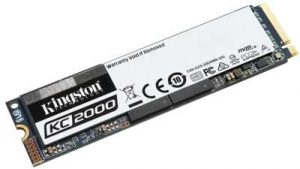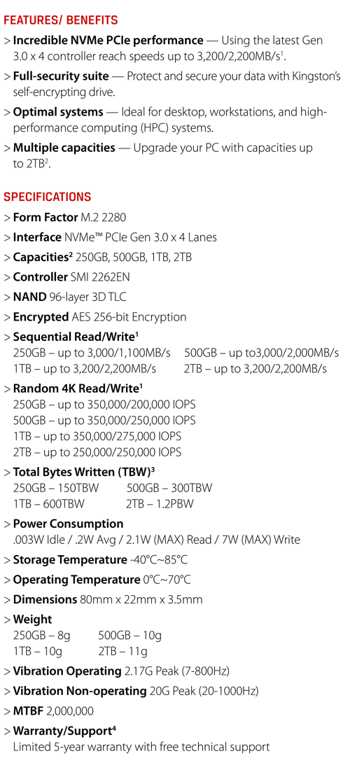Kingston KC2000 M.2 NVMe PCIe Up to 2TB SSD With 96-Layer 3D TLC NAND
Up to 3,200MB/s and 2,200MB/s RW speed, supporting end-to-end data protection using 256-bit AES hardware-based encryption and allowing usage of ISVs with TCG Opal 2.0 security management solutions
This is a Press Release edited by StorageNewsletter.com on May 27, 2019 at 2:23 pmKingston Digital, Inc. announced KC2000, its next generation M.2 NVMe PCIe SSD for enterprise and power users.

The KC2000 NVMe PCIe SSD delivers performance using the Gen 3.0 x 4 controller and 96-layer 3D TLC NAND. Offering read and write speeds up to 3,200MB/s and 2,200MB/s (1), respectively, it delivers performance and endurance, and improves workflow in desktop, workstations and HPC systems.
KC2000 is a self-encrypting drive that supports end-to-end data protection using 256-bit AES hardware-based encryption and allows the usage of ISVs with TCG Opal 2.0 security management solutions such as Symantec, McAfee, WinMagic and others. It also has built-in Microsoft eDrive support, a security storage specification for use with BitLocker.
“KC2000 is designed for high-performance client usage especially intensive workloads on PCs and workstations that demand speed and reliability,” said Justin Karasek, SSD business manager, Kingston. “The drive provides greater flexibility, is available in multiple capacities up to 2TB2 and its M.2 form factor saves space. KC2000 is the perfect SSD for users looking for the ultimate storage upgrade.“
KC2000 NVMe PCIe SSD is available in 250, 500GB, one and 2TB (2) capacities and is backed by a limited 5-year warranty and free technical support.
(1) Based on ‘out-of-box performance’ using a PCIe 3.0 motherboard. Speed may vary due to host hardware, software, and usage. IOMETER Random 4K R/W is based on 8GB partition.
(2) Some of the listed capacity on a flash storage device is used for formatting and other functions and thus is not available for storage. As such, the actual available capacity for storage is less than what is listed on the products. For more information, go to the company’s flash memory guide.
(3) Total Bytes Written (TBW) is derived from the JEDEC Client Workload (JESD219A).
(4) Limited warranty based on 5 years or ‘Percentage Used’ which can be found using the SSD Manager. For NVMe SSDs, a new unused product will show percentage used value of 0, whereas a product that reaches its warranty limit will show percentage Used value of greater than or equal to 100.














 Subscribe to our free daily newsletter
Subscribe to our free daily newsletter

